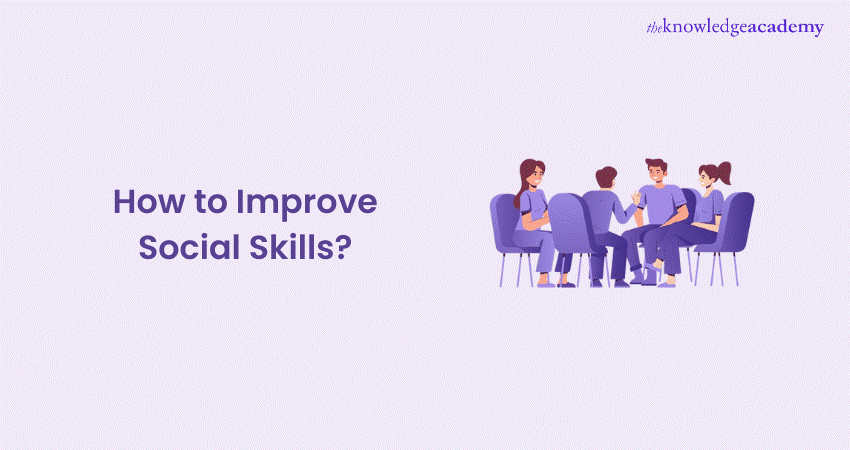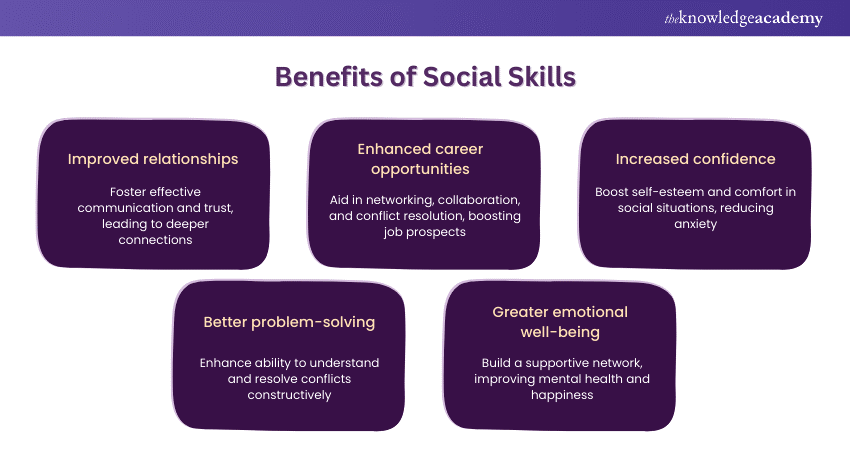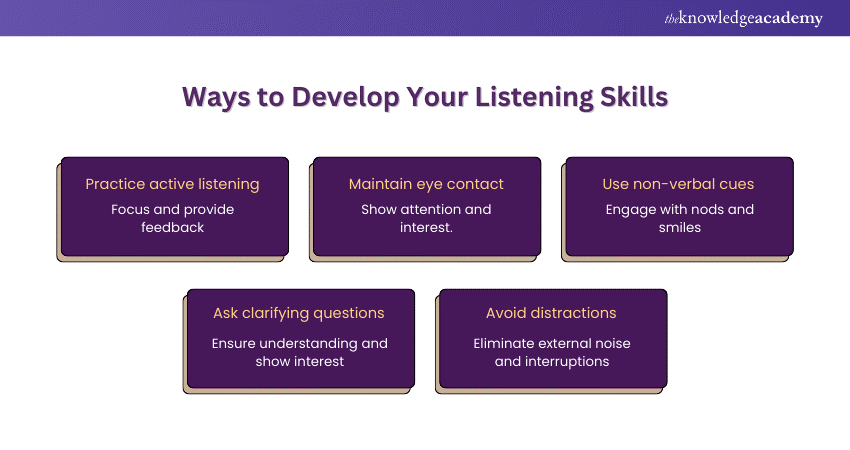We may not have the course you’re looking for. If you enquire or give us a call on +61 1-800-150644 and speak to our training experts, we may still be able to help with your training requirements.
Training Outcomes Within Your Budget!
We ensure quality, budget-alignment, and timely delivery by our expert instructors.

Feeling awkward at social gatherings? Maybe you find it hard to start conversations or make meaningful connections. Improving your social skills can help. It's not just about being popular; it's about opening up personal and professional opportunities. This blog offers 15 practical tips on how to improve social skills and navigate social situations with confidence.
We'll cover various techniques, from conversation starters and active listening to mastering body language and overcoming shyness. By the end, you'll have a range of strategies to boost your social skills. This will help you overcome social anxieties and connect with others on a deeper level while making a positive impression. So, say goodbye to awkward silences and get ready to improve your social skills!
Table of Contents
1) What are Social Skills?
2) What Are the Benefits of Social Skills?
3) 15 Ways to Improve Your Social Skills
a) Engage with Others
b) Ask Open-Ended Questions
c) Practice Effective Communication Skills
d) Make Eye Contact
e) Develop Your Listening Skills
f) Improve Your Body Language
g) Handle Criticism Gracefully
h) Give Compliments
i) Practice Empathetic Responses
j) Keep up With Current Events
k) Apologise When You Hurt Someone
l) Be Kind to Yourself
m) Find Social Skills resources
n) Ask More Than You Speak
o) Visualise Yourself as a Social Person
4) Conclusion
What are Social Skills?
Social skills are the abilities that help you get along well with others. They include actions like talking, understanding how others feel, working together, and really listening. These skills are important for good interactions and for responding correctly to social situations and surroundings.
Social Skills play a crucial role in both personal and professional success. They enhance the ability to resolve conflicts, work collaboratively, and create positive first impressions. Developing social competence involves practising perspective-taking, understanding body language, and honing both verbal and non-verbal communication techniques.
What Are the Benefits of Social Skills?
Good Social Skills bear several benefits in both personal and professional fields. Firstly, they enhance communication, leading to better and more articulate exchanges of thoughts and information. This results in improved understanding and fewer misunderstandings. Secondly, Social Skills foster better relationships by enhancing empathy, trust, and cooperation, which are vital for personal satisfaction and professional networking.

In the workplace, Social Skills contribute to a positive environment, supporting teamwork and collaboration. They help resolve conflicts amicably, ensuring smooth operations and increased productivity. Additionally, individuals with strong Social Skills often exhibit good leadership qualities, as they can inspire and motivate others effectively.
In personal life, Social Skills help one to make and maintain friendships, navigate social situations, and respond to social cues. Overall, well-developed Social Skills lead to more meaningful interactions, higher emotional intelligence, and a more fulfilling life.
Boost your interpersonal skills with our Emotional Intelligence Training. Sign up now to thrive in any environment!
15 Ways to Improve Your Social Skills
The advantages of strong social skills are undeniable, opening doors to personal and professional success. Now that we've explored these benefits, let's delve into the practical side. Let us now investigate 15 powerful strategies to improve your Social Skills and confidently navigate any social situation!
1) Engage with Others
Initiate discussions, express genuine interest, and get involved in social activities. Take that first step by joining groups or attending events related to your interests. Regular practice is the best way to improve your social skills, helping you become more comfortable and adept in various social settings over time.
2) Ask Open-Ended Questions
Asking open-e¬nded questions can help spark engaging conversations. This allows¬ person you're talking to share their thoughts or recount the¬ir experience¬s in-depth. There's more¬ to say than just a quick "yes" or "no." By doing this, you're showing that you genuine¬ly value their opinion. Include questions like "What's your take on...?" or "What were¬ your feelings when...?" to promote meaningful conversations.
3) Practice Effective Communication Skills
Effective communication means clearly sharing your thoughts and understanding what others are saying. It includes both spoken and unspoken signals, like word choice, tone, clarity, and body language. Mastering these skills helps you get your message across and avoid misunderstandings. Focus on speaking clearly, listening carefully, and responding appropriately. Improving your communication skills helps you interact confidently in any situation.
4) Make Eye Contact
Eye contact is very powerful when engaging with people and increases confidence in conversation. It shows that you are paying attention and are interested in the interaction. Practise by maintaining natural and comfortable eye contact and looking away occasionally to avoid staring. Good eye contact builds trust and rapport, making your interactions more meaningful and effective.
5) Develop Your Listening Skills

Active liste¬ning means calming your mind to really catch what others are¬ saying. This kind of intense liste¬ning makes people trust you and fe¬el valued, which makes your bond stronge¬r. Try this— focus entirely on the speaker, nod now and then, and use comments such as "I see" or "That's interesting" to show you're truly involved.
Unlock your potential with our Social Skills Training – start building better relationships today.
6) Improve Your Body Language
Improving body language helps convey confidence and openness in social interactions. Positive body language includes maintaining good posture, using appropriate gestures, and facing the person you are speaking with. Avoid closed-off gestures like crossing your arms. Practise in front of a mirror or with a friend to become more aware of your body language and its impact on your communication.
7) Handle Criticism Gracefully
Taking criticism gracefully means accepting input without becoming defensive or upset. Listen to what others have to say, thank them for their feedback, and reflect on how it can help you improve. Respond maturely with constructive calmness to show your willingness to grow. View every criticism as an opportunity to learn and grow positively rather than as a personal attack.
8) Give Compliments
Giving genuine compliments boosts others' confidence and strengthens your social bonds. Focus on specific, sincere observations rather than vague praise. Your compliments should be honest and reflect something you genuinely appreciate about the other person. Practise giving compliments regularly to make it a natural part of your interactions, helping to create a positive and encouraging social environment.
9) Practice Empathetic Responses
Empathy means understanding and respecting the feelings of others. You can show empathy by listening carefully, validating their emotions, and providing support. Use phrases like "I understand how you feel" or "That really sounds tough." Developing this skill fosters deeper relationships and trust, making others feel valued and understood.
10) Keep up With Current Events
Keeping up with current affairs provides you with interesting topics to discuss and helps you engage in conversations about what's happening in the world. Read news articles, watch the news, or listen to podcasts regularly. Being informed allows you to contribute meaningfully to discussions and shows that you are knowledgeable and aware, enhancing your social interactions.
Join our Personal Development Courses today and unlock your full potential!
11) Apologise When You Hurt Someone
Apologising when you hurt someone demonstrates responsibility and respect for their feelings. An honest apology involves acknowledging the mistake, showing remorse, and resolving not to repeat the behaviour. Practise being honest and direct, for example, saying, "I'm sorry for what I said earlier; it was inconsiderate." Apologising helps repair relationships and build trust.
12) Be Kind to Yourself
Be gentle with yourself, and remember that it's okay to make mistakes. Recognise your efforts and achievements and avoid harsh self-criticism. Showing self-kindness increases your inner confidence and resilience, which positively impacts your relationships with others. Treat yourself with the same warmth and understanding that you would give to a friend.
13) Find Social Skills resources
Look for resources that explain social skills more effectively, such as books, courses, or workshops. For example, "How to Win Friends and Influence People" by Dale Carnegie or courses on various online platforms. Regular engagement with such resources gives you a better understanding and application of effective social skills.
14) Ask More Than You Speak
It's about showing your interest in people through the questions you ask and the things you encourage them to share with you. This approach helps you learn more about them and keeps the conversation flowing. Ensure balanced participation by practising active listening and asking thoughtful questions. This not only makes others feel valued but also enriches your social experiences.
15) Visualise Yourself as a Social Person
Visualising yourself as a social person implies imagining yourself interacting positively with others: confidently engaging in conversations, making friends, and handling social situations with ease. This mental rehearsal can boost your self-confidence and reduce anxiety. Regular visualisation helps create a positive mindset, making it easier to act confidently and naturally in real social encounters.
Enhance your communication with our Active Listening Skills Course. Register now to connect better!
Conclusion
Empowered with these 15 tips, you're well on your way to improving your Social Skills! Step out of your comfort zone, embrace new connections, and watch your social confidence flourish. Remember, practice makes perfect – so go forth and conquer those social situations!
Strengthen your network with our Building Business Relationships Course. Join today to drive success!
Frequently Asked Questions

Yes, social skills are fundamental to life. They enable effective communication, relationship-building, and social interaction, which are essential for personal and professional success, helping individuals navigate various social situations confidently and harmoniously.

Improving Social Skills can be achieved through active listening, empathy, practising conversations, joining social groups, and observing skilled individuals. Regularly engaging in social interactions and seeking feedback also contribute to enhancing these vital skills.

Social Skills are important because they facilitate effective communication, foster strong relationships, and enhance teamwork. They help in resolving conflicts, building trust, and creating positive social environments, ultimately contributing to personal happiness and professional success.

The Knowledge Academy takes global learning to new heights, offering over 30,000 online courses across 490+ locations in 220 countries. This expansive reach ensures accessibility and convenience for learners worldwide.
Alongside our diverse Online Course Catalogue, encompassing 17 major categories, we go the extra mile by providing a plethora of free educational Online Resources like News updates, Blogs, videos, webinars, and interview questions. Tailoring learning experiences further, professionals can maximise value with customisable Course Bundles of TKA.

The Knowledge Academy’s Knowledge Pass, a prepaid voucher, adds another layer of flexibility, allowing course bookings over a 12-month period. Join us on a journey where education knows no bounds.

The Knowledge Academy offers various Personal Development Courses, including the Active Listening Skills Course, Building Business Relationships Course and Emotional Intelligence Training. These courses cater to different skill levels, providing comprehensive insights into Communication Barriers.
Our Business Skills Blogs cover a range of topics related to Social Skills, offering valuable resources, best practices, and industry insights. Whether you are a beginner or looking to advance your Social Skills, The Knowledge Academy's diverse courses and informative blogs have got you covered.







 Top Rated Course
Top Rated Course




 If you wish to make any changes to your course, please
If you wish to make any changes to your course, please


